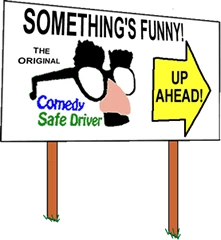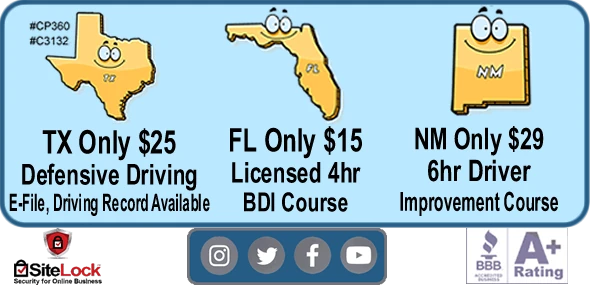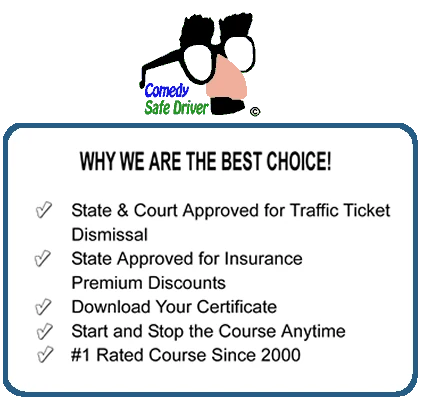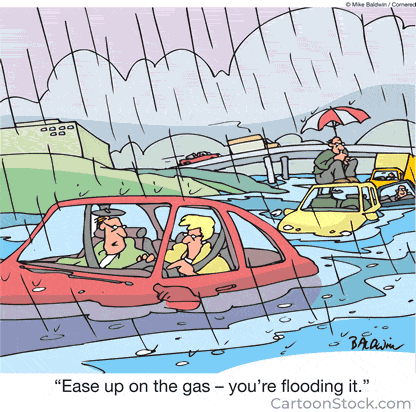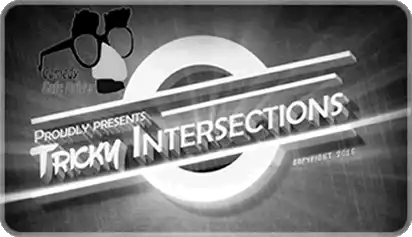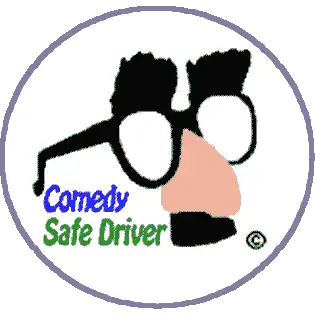
Experience the Physiological Comedy Class with Comedy Safe Driver
Welcome to Comedy Safe Driver! We provide an engaging and humorous approach to defensive driving with our unique Physiological Comedy Class.
The Perils of Blood Alcohol Content: Be Informed!
Driving under the influence (DUI) is a serious offense due to the significant risks it poses, not only to the driver but also to others on the road. Various authoritative bodies like the Texas Alcoholic Beverage Commission (TABC) and the National Highway Traffic Safety Administration (NHTSA) have conducted numerous studies and shared important statistics about the impact of Blood Alcohol Content (BAC) on driving abilities.
In Texas, as per TABC, a person with a BAC of 0.08% is considered legally intoxicated. This limit is not arbitrary; it is based on data that show significant impairment in motor skills and cognitive functions at this level. However, it's critical to note that even levels below this legal limit can still cause impairments.
For instance, according to the NHTSA, a BAC as low as 0.02% can already begin to affect a person's ability to multitask. This is particularly dangerous while driving because it requires the simultaneous handling of multiple tasks, including steering, managing speed, observing other vehicles and pedestrians, and reacting to sudden changes.
As BAC increases to 0.05%, it starts to impact coordination - a key aspect of safe driving. This could lead to difficulty in operating the steering wheel or brake, potentially causing accidents as the ability to maneuver the vehicle safely is compromised.
At a BAC of 0.08%, the risks are even more severe. The NHTSA has found that at this level, more complex brain functions such as judgment, self-control, reasoning, and memory are significantly impaired. This means drivers might make poor decisions, misjudge distances or speeds, forget traffic rules, or be unable to control their impulses, which could lead to risky behaviors like speeding, not maintaining a safe distance, or ignoring traffic signals.
In conclusion, any level of alcohol in the system can impact a driver's abilities and increase the risk of accidents. These sobering statistics underline the importance of the "don't drink and drive" message. If you've been drinking, it's always safer to find an alternative way home, like using a rideshare service, calling a taxi, or having a designated sober driver.
Physiological Comedy Class: A New Take on Defensive Driving
Defensive driving is crucial to maintaining safety on the roads. However, traditional approaches to learning can sometimes feel dry and monotonous. That's where our Physiological Comedy Class comes in - a refreshing take on defensive driving that merges essential knowledge with humor, making the learning experience not just informative, but also entertaining.
In this class, we delve into a variety of topics such as:
-
Effects of Alcohol and Drugs: We know driving under the influence is dangerous, but do we understand why? We'll explore the physiological impact of alcohol and drugs on the body and how it impairs our ability to drive. And of course, we'll inject our lessons with laughter, with skits mimicking the exaggerated effects of alcohol and drugs.
-
Physiological Effects of Alcohol and Drugs: When you consume alcohol, it gets absorbed into your bloodstream and can impair the functioning of your nervous system, slowing down your brain's processing speed. Alcohol affects the areas of the brain that control movement, speech, judgment, and memory, leading to blurred vision, slower reaction times, and poor coordination, all of which are crucial for driving. Alcohol can also reduce your ability to make good decisions or recognize dangerous situations, making accidents more likely.
Drugs, on the other hand, depending on their type, have a variety of impacts. For instance, marijuana can slow reaction time, impair the judgment of distance, and decrease coordination. Cocaine or methamphetamine can lead to aggressiveness and reckless behavior. Prescription medicines can cause drowsiness, dizziness, and impaired cognitive functioning.
-
Impairment of Driving Skills: The skills most needed for safe driving, including judgment, concentration, comprehension, coordination, visual acuity, and reaction time, can all be negatively affected by the consumption of alcohol and drugs. For example, alcohol can impair depth perception, making it harder to tell if other vehicles are getting closer or farther away. Similarly, marijuana use can make it difficult for a driver to maintain a consistent speed or stay in their lane.
-
Injecting Lessons with Laughter: You can make your presentation interactive and engaging by including skits that show the exaggerated effects of alcohol and drugs. For example, a skit can be performed where someone pretending to be under the influence of alcohol is trying to walk in a straight line or trying to pass the "finger-to-nose" test and failing hilariously. Another skit can involve someone under the effect of drugs trying to respond to basic questions or instructions with outlandish or nonsensical answers. These humorous examples not only entertain but also underscore the severity of the situation in a memorable way.
-
-
Understanding the Body's Response to Stress: Ever experienced road rage? Or that heart-racing moment when a car swerves in front of you unexpectedly? We'll talk about how our body responds to stress and surprises, and provide tips on managing these situations - all with a pinch of comedy to keep things light.
-
Understanding the Body's Response to Stress: Stress triggers the body's "fight or flight" response, a biological reaction that prepares us to either confront or flee from potential harm. This response begins in the brain and leads to the release of hormones like adrenaline and cortisol. Adrenaline increases heart rate, blood pressure, and energy supplies. Cortisol suppresses non-emergency bodily functions like the immune response and digestion, curbs functions that would be nonessential in a fight or flight situation, and enhances the body's ability to repair tissues.
In driving situations, like when a car swerves in front of you unexpectedly, this response can result in a racing heart, quickened breath, and heightened alertness. However, it might also cause shaking, a dry mouth, or a feeling of being "frozen".
-
Managing Stressful Situations: It's important to recognize these stress signals and learn how to manage them effectively. Taking deep, slow breaths can help calm the body and mind, slowing down the heart rate and reducing adrenaline levels. It's also important to take breaks during long drives to prevent fatigue and stress buildup.
Reminding oneself to not take others' driving behavior personally can also reduce stress levels. If someone else's driving is causing stress, it might be best to let them pass to create distance.
-
Injecting Lessons with Comedy: Humor can be a fantastic tool for defusing stress and for teaching these important concepts. For instance, you could role-play an exaggerated version of "fight or flight" with one person as the 'driver' and another as the 'stress response'. The 'stress response' could continually hassle the 'driver' with sudden alerts and overreactions to minor events, much to the driver's annoyance.
Additionally, you could create a comedic sketch where a character uses outrageous stress-management techniques, like shouting calming affirmations in a traffic jam or attempting to meditate while at a red light.
Remember that the goal is to educate while entertaining. While these scenarios may be exaggerated for comedic effect, they aim to illustrate serious points about the body's response to stress and the importance of stress management.
-
-
Importance of Rest: Ever felt your eyelids getting heavy while on a long drive? That's your body crying for rest! We'll discuss the dangers of drowsy driving, tying in anecdotes and humorous skits about the ridiculous things people do when they're half-asleep.
-
Distractions and Multitasking: We're all guilty of it - taking a quick glance at our phone, changing the radio station, or even eating while driving. In this part of the class, we'll talk about the cognitive limitations of multitasking, and how distractions can lead to dangerous situations. And of course, we'll have a good laugh about the absurd lengths we sometimes go to 'save time'.
-
Decoding Body Language - Of Other Drivers: Believe it or not, you can predict a lot about a driver's next move based on their driving behavior. We'll teach you the art of deciphering driver body language in a fun, interactive session with hilarious role-play scenarios.
The goal of this Physiological Comedy Class is to make the content more relatable and memorable. By using humor, we aim to break down complex concepts and foster an environment where learning about safety is not seen as a chore, but an enjoyable experience. So come join us, and let's put the 'fun' back into the fundamentals of defensive driving!
Why Choose Physiological Comedy Class?
Why stick to dull, mundane defensive driving courses when you can learn with laughter? With our Physiological Comedy Class, you don’t just learn – you enjoy the learning process.
We believe that comedy can be a powerful tool for teaching, especially when dealing with serious topics like defensive driving and alcohol awareness. So why not get the best of both worlds?
Join our Physiological Comedy Class today and embark on the most entertaining journey towards safe driving!

